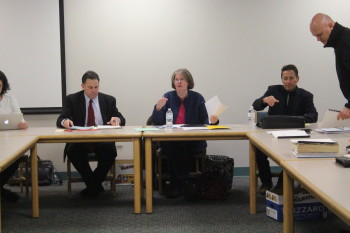Photo: William Lovallo (right), the newly-elected chair of the High School Building Committee, speaking with BHSBC member Bob McLaughlin.
When the Wellington Elementary School opened on Sept. 25, 2011, Sarah Lovallo cut the ceremonial ribbon for the kindergarteners entering the school for the first time.
Lovallo, who is in fourth grade at the Wellington, is eight years from graduating from Belmont High School, which may seem like time enough for her to cut the ribbon for a new high school.
But her father, Willam Lovallo, who was selected as chair of the newly-created Belmont High School Building Committee on Monday, April 4 at the first meeting of the committee held at the Chenery Middle School, doesn’t think Sarah will have a second cut at the ribbon.
“This is beginning to look like it will be closer to ten years before the construction is completed,” said Lovallo, who was the unanimous selection of the 15 member committee.
The Homer Road resident’s professional background as a vice president at the Boston-based civil engineering firm LeMessurier Consultants along with being a veteran of the town’s Permanent Building Committee and building committees including the fire houses, Beech Street Center, and the Wellington will bring “that remarkable knowledge” to the post, said Patricia Brusch, who led the inaugural meeting.

Pat Brusch (center) at the inaugural meeting of the Belmont High Building Committee.
Brusch, who has been involved with constructing municipal and school buildings in Belmont for three decades, gave the committee a brief outline of what could be the next ten years of planning, financing and construction of a new high school.
With an expected infusion of $1.75 million from the proceeds of the sale of town-owned property on Woodfall Road – which will need to be approved by a majority vote at a Special Town Meeting on May 4 which will be a part of the annual Town Meeting – the committee will use the funds to:
- create a feasibility study that will include environmental testing and assessment,
- the hiring of a project manager and
- Schematic designs for a new or renovate the high school.
After the feasibility study, the committee in partnership with the Massachusetts School Building Authority will need to decide between one of four options for the building.
- Keep the present building and commit to repairing problem areas.
- Renovate the building “within the walls.”
- Renovate and construction of an addition.
- Build a new high school building at a nearby location.
After one of the four options is selected, the process moves to the schematic design stage. Once that is completed, then the town will need to come up with a budget which will come from a debt exclusion.
Brusch said a quick calculation using past examples such as the Wellington, the most likely date for a vote by town residents will occur two years from now during Town Election 2018, with an outside possibility of the fall of 2017 “if everything goes smoothly but that rarely [happens].”
Brusch also noted state law prohibits the Building Committee from advocating or showing support for the debt vote.
“Citizens will be asked to form” an independent committee “which is not a problem in this town,” said Brusch, whose last piece of advice to the group is “stay within your budget!”
“The first reason is credibility,” said Brusch, as the cost of the construction “will be a huge nut for the town to crack” which will be easier to do if the committee can demonstrate that a new high school “is not a Christmas tree with everything below.”
Both Brusch and Town Administrator David Kale emphasized that any final dollar figure and project timeline will be set only after the schematic designs are complete. But Brusch did say the long advertised amount of $100 million was used by town departments as “a placeholder” with a more realistic figure about 50 percent higher.
